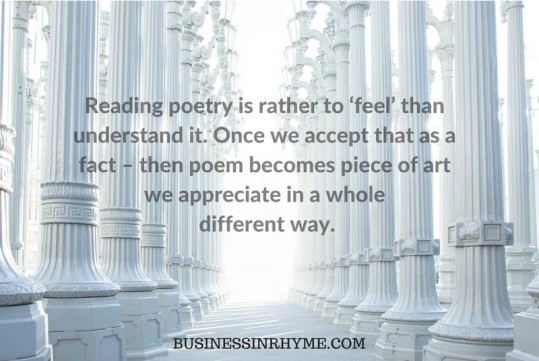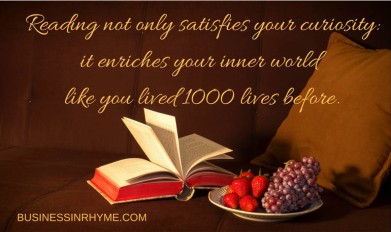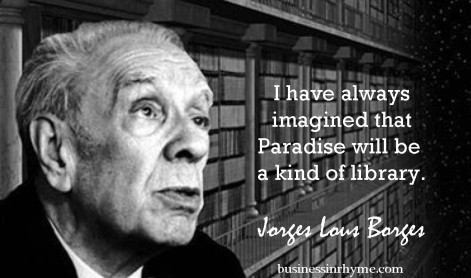As much as I do believe that technology has given us a lot – a sort of commodity and easiness in our lives, it is also taking from us. We are becoming more accustomed to live fast, do as much as possible while some little enjoyable things flash in a split second, that we are forgetting how they used to feel.
Scrolling down the silver screen, just superficial browsing of information without any deeper thought of what we are actually reading has transferred also on other types of written media. When it comes to poetry – it does require your whole being’s attention.
As discussed here on why people don’t like poetry, I want today to offer you some pointers that might help you enjoy reading poetry even more and discover other poets who’s work sometimes stays undeservedly neglected.
- Read the poem more than once. If possible, even try reading it out loud. Poetry differs from prose in sense that is not everything straightforward and open. Words are usually condensed and with each rereading we gain more clarity and can appreciate the message it carries. I have found that it is important not to force ourselves to understand everything, all at once. It is similar to saying ‘when the student is ready, teacher will appear’. For some poems we might not be ready to ‘digest the truth’ it has to offer, in one particular time. Not every poem is ‘our cup of tea’ and that is completely fine and acceptable. Our ultimate goal shouldn’t be to fathom what the poet wanted to say or what question the poem answers, but rather to let something in the experience of reading catches our intention, to find our own value and meaning.
- Be aware of your thoughts and feelings that arise while reading the poem. Is there a specific word or phrase you like/dislike? Look at the prevailing theme in the poem and examine those internal images poem is provoking in you.
- In our reading practice we may often encounter poems with strange structure, omitted syntax and broken grammar rules. As at the beginning such poem might look weird, focus on the words – as it creates greater emotional response in the reader. Poetry connects unrelated things in the most unusual ways, so stay open to any appearing ambiguity. Enjoy the metaphors, images, rhythm – be rather the appreciator of the artistic expression, than the critic.
- Is there a poem you find special and dear to you? Write your response to that poem. Or ‘upgrade’ the existing poem with your own life experiences, thoughts and feelings. In such way, not only you are enjoying reading your favorite poem, but you are working on your own writing skills.
- And the last hint I can offer you is in your own writing practice, try to mimic the style of your favorite poet. It will help you to better understand a poet’s intentions and how to express yourself in a different writing form.
Maybe C. Darwin’s quote sums it all the best:
My mind has changed during the last twenty or thirty years… Now for many years I cannot endure to read a line of poetry… I have also almost lost any taste for pictures or music… My mind seems to have become a kind of machine for grinding general laws out of large collections of facts…
If I had to live my life again I would have made a rule to read some poetry and listen to some music at least once every week… The loss of these tastes is a loss of happiness, and may possibly be injurious to the intellect, and more probably to the moral character, by enfeebling the emotional part of our nature.
The Autobiography of Charles Darwin, 1809-1882 (pp. 138-139)
If you liked this post, please share. And, If you you are interested in getting more inspiration for your creativity, writing and personal growth, sign up for our free monthly newsletter. You’ll get a free e-book with 31 daily prompts to inspire your writing. To learn more about coaching opportunities click here. For additional tips, follow us on twitter and connect with us on facebook.










